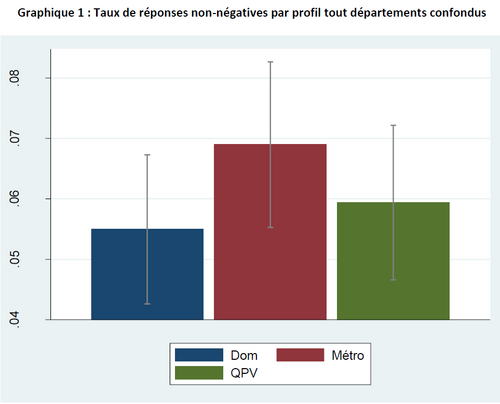Use the drop-down summary to access the articles in the folder.
Terms of republication
You can republish this article for free on your website, blog, etc.
Lazy islanders - stereotypes impacting people from French overseas departments
Behind the scenes of research
“Hello, I would like to apply for the position of waiter at your establishment. Please find attached my CV, where you will see that I am a professional waiter with previous experience at two other establishments.”
This is the type of message received by 1,156 restaurants located in Fort-de-France (Martinique), Pointe-à-Pitre (Guadeloupe), Saint-Denis (La Réunion) and Paris. Behind these spontaneous applications, there was no real young man, but rather fake profiles: the candidate’s last name, first name, experience and training were completely invented for the discrimination testing campaign as part of the MELODI-DOM project.
Four cities, two criteria, one discrimination test
The objective of this operation was to compare the probability of receiving a job interview based on two criteria: whether a candidate comes from a French Overseas Department or mainland France, and whether or not they live in a priority urban district. “For this, we created three fictitious waiter profiles for each city: a candidate from a French Overseas Department living in a neutral district, a second candidate from a French Overseas Department living in a priority district, and a candidate from mainland France also living in a neutral district. In each case, the candidates were given the most common first and last names. For example, Anthony Martial in Guadeloupe or Jean Payet in La Réunion,” says Yannick L'Horty, professor of Economics at Université Gustave Eiffel and TEPP Director. Each restaurant – approximately 300 per city – received three spontaneous applications, one for each fake profile. “MELODI-DOM is one of the few studies with multi-site testing. This allowed us to draw many observations, thereby making the study more robust and producing more statistically conclusive results,” says Yannick L’Horty.
People from French Overseas Territories subject to negative bias
After three rounds of spontaneous applications on 11, 13 and 18 May 2021, the outcome was definitive: the French Overseas Department candidate received 20% fewer positive responses than the mainland France candidate. In other words: there is employment discrimination towards people from French Overseas Departments. “There is a preference for mainlanders, not only in Paris, but also in the French Overseas Territories,” says the research professor. To explain these dismal results, the researcher offers two possible reasons: recruiter stereotypes about training courses in French Overseas Departments being “lower-quality” than mainland France courses; and negative stereotypes about people from French Overseas Territories being “less efficient or productive”. This group suffers statistical discrimination, rejected due to stereotypical flaws attributed to such individuals due to their place of origin. On the other hand, the study did not show the presence of discrimination on the basis of a candidate living in a priority district, which may be a result of the “emplois francs” policy*.
Graph 1: Rate of non-negative responses per profile, all departments
Communicating to give visibility to discrimination
The results of MELODI-DOM were presented on 10 October 2021, at a press conference organised by SOS Racisme at the Ministry for Overseas Territories. This communication initiative was essential to give visibility to phenomena of discrimination. Multiple media outlets attended the press conference (see “Co-constructed knowledge and results”) as well as Elisabeth Moreno, the former Minister for Equality between Women and Men, Diversity and Equal Opportunities, Dominique Sopo, President of SOS Racisme and Didier Laguerre, Mayor of Fort-de-France.The results were also presented in October 2022 at Proceedings of Overseas Research (ARUM). Lastly, this first series of discrimination testing for MELODI-DOM was the subject of a paper, which has been submitted to journal La Revue économique.
Elisabeth Moreno, former Minister for Equality between Women and Men, Diversity and Equal Opportunities, at the press conference on 10 December 2021.
* “Emplois francs” is a government programme to support employment. It provides financial grants to any private-sector employer that recruits a jobseeker or young person being supported by a youth unemployment centre residing in a priority district for a permanent position or temporary contract of at least six months.

![[Translate to English:] Licence creative commons BY-SA 4.0 [Translate to English:] Licence creative commons BY-SA 4.0](https://reflexscience.univ-gustave-eiffel.fr/fileadmin/ReflexScience/Accueil/Logos/CCbySA.png)